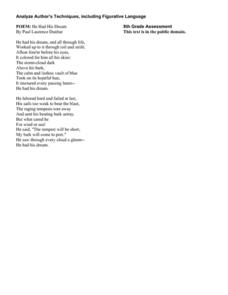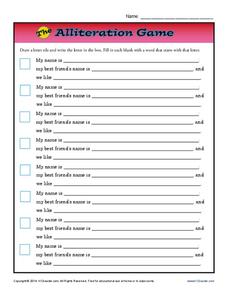Curated OER
Metaphors
Metaphors open doors to descriptive language for your poets. They read the poem "What is the Sun" and record all the metaphors they find. Then, scholars change one of them to a simile. After answering two more comprehension questions,...
Curated OER
Similes
Similes are a great way to get your writers thinking about descriptive details. They read a brief explanation which covers clichés and the general wording of a simile. Then, learners try a few on their own. First, they complete nine...
Curated OER
Figurative Language Practice
In this figurative language learning exercise, students match ten words to their synonyms. Students may use a dictionary if necessary. Each given words has three synonyms.
Curated OER
Analyze Author’s Techniques, Including Figurative Language
Paul Laurence Dunbar's poem "He Had His Dream" is the focus of a quick exercise. Pupils read the poem and answer four multiple choice questions and one short answer question about specific lines in the poem and the author's purpose....
K12 Reader
Proverbs and Adages: What’s the Meaning?
Your kids have probably heard these idioms before, but do they know what they mean? Help them learn that haste makes waste, an ill wind blows no good, and that ignorance is bliss with a list of popular expressions.
K12 Reader
Alliteration Game
Practice alliteration with a fun game! Kids match names to a best friend's name, and add something they both like.
K12 Reader
Adventures with Alliteration! - Verbs
Work with wonderful words within a well-written learning exercise! Kids match alliterative verbs to fifteen names in order to get alliterative phrases.
Curated OER
Reading a Classic Novel
Charles Dickens offers an excellent example of sensory writing in this reading comprehension worksheet. Learners read excerpts from the novel Hard Times in which he describes the New England industrial city of Coketown. They consider why...
Curated OER
Simile Practice
Inspire creative writing by studying similes. This sheet provides learners with 10 different topics, and they must create a simile for each topic. Example topics include: favorite teacher, the waterfall, a parrot, the first day of...
K12 Reader
The Road Not Taken
"The Road Not Taken," is the focus of an exercise that asks readers to identify the figurative meaning of Robert Frost's poem.
Amazon Web Services
Idiom Dictionary
Examining idioms is a peace of cake when using this graphic organizer! Here, grammarians identify an idiom and use it in a sentence. Then they investigate its literal meaning versus its figurative meaning, and accompany each one with a...
Winterhill School
Poetry Analysis
Gain greater insight into poems using a poetry analysis learning exercise. Here, scholars follow steps and answer questions to dissect any poem. Topics include the poem's meaning, theme, technique, and structure, as well as personal...
Curated OER
Extra Practice with Time: Using menos
How do you tell time in Spanish? Provide each learner with this reference guide and practice sheet to introduce telling time in another language. Begin by reading through the first two informational pages that describe how time is...
Curated OER
Identifying Figurative Language
In this figurative language worksheet, students identify figurative language in the sentences and explain their answers. Students complete 10 problems.
E Reading Worksheets
Idioms Test
How well do your class members understand the figurative meaning of idioms? Find out with this 15 question multiple choice assessment.
K12 Reader
Alliteration: It’s a Zany Zoo!
Elephants eat and cheetahs chase in this zany zoo! Kids survey a list of ten animals before adding in an adjective and verb for each to form an alliterative phrase or sentence.
Curated OER
Using the Imperfect Tense & the Preterite Tense
In Spanish, there are several verb tenses used to express things that happened in the past. The tricky part is figuring out which one is appropriate for your situation. Let this resource help you and your pupils as they master the...
TV411
How Many Languages Do You Speak When You Speak English?
What do the words pizza, broccoli, and ciao have in common? Why they are all English words that originally came from Italian. Ask your middle schoolers to guess the origins of a list of words by matching the word with the language from...
K12 Reader
Proverbs and Adages: What Do They Mean?
You shouldn't judge a book by its cover, but feel free to find the silver lining in a worksheet about common proverbs and adages. Learners read six popular adages and write their literal definitions on the lines provided.
E Reading Worksheets
Poetic Devices Finder
Track the poetic elements in any text with a guided reading worksheet. Kids note examples of consonance, alliteration, onomatopoeia, repetition, rhyme, and rhythm when reading a poem or story, and provide a short explanation as to why...
K12 Reader
Finish the Proverbs and Adages
How many common idioms do you know? Test your knowledge with a set of ten phrases to complete. The idioms range in difficulty level, making it a good challenge for even advanced readers.
Houghton Mifflin Harcourt
Grade 4 Reading Item Specifications
Is it the end of the school year and you're in need of test practice? Use a set of reading passages to challenge fourth graders to answer questions based on what they read. Some of the questions require readers to compare and contrast a...
abcteach
Dragon Alliterations
You don't have to slay the dragon in this activity. Young writers review poetic devices with a set of worksheets about alliteration and similes. Once they finish waxing poetic about their dragon friends, they craft a final acrostic poem.
Welcome to Ms Bosello's Class!
Alliteration Worksheet
Alliteration and imagery are two vital parts of any well-written poem. Encourage your young poets to include these devices with a set of activities designed to get them thinking, writing, and creating.

























